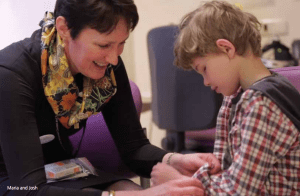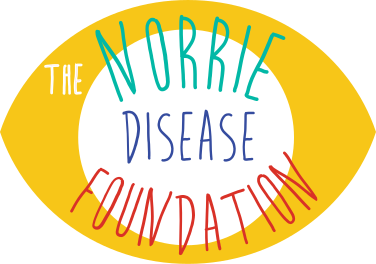Diagnosis

Norrie Disease is diagnosed on the basis of clinical eye findings if the individual presents with congenital blindness.
Clinical genetic testing is available to help confirm the diagnosis.
Management
The management of Norrie Disease is targeted towards establishing the extent of the disease. This determines the needs of the individual and is likely to require the coordinated efforts of a team of specialists such as those listed below.
Opthalmologists
Definition: Ophthalmologists are medically trained doctors who care for patients who have eye conditions.
Role: The role of the Ophthalmologist would be to examine the eyes and decide on appropriate treatment. This could include removal of cataracts, treatment for glaucoma, laser treatment, shells for the eyes (for structural and cosmetic purposes) or prosthesis.
Those who have not completely lost their vision have been treated with surgery or laser therapy in infancy in the US. Children in the UK are rarely offered eye surgery. If surgery is offered, it would be to prolong light perception vision. However, there is no good data available yet as to whether this surgery achieves this aim, and there are significant risks associated with surgery.
As Norrie disease is a rare condition, you may want an appointment to see a paediatric ophthalmologist at GOSH with a particular interest in this condition. Please discuss this with your local ophthalmologist, GP and /or paediatrician who will be able to make the appropriate referral.
Your initial and subsequent appointments may provide you with an opportunity to discuss further medical referrals to other services at GOSH such as Audiology or Endocrinology if these are clinically indicated. (see references to Audiologists and Endocrinologists below).
Clinical Geneticist
Definition: Clinical geneticists are doctors who diagnose and manage families with genetic disorders.
Role: The role of the Clinical Geneticist is to establish the genetic origin of the disease and to provide genetic counselling to the family.
Audiologists
Definition: Audiologists identify and assess hearing and balance function and their associated disorders
Role: The role of the Audiologist is to carry out regular hearing tests and to advise on hearing aids or cochlear implants if required. A cochlear implant is an electronic device used to bypass the damaged hair cells in the inner ear.
Endocrinologists
Definition: An paediatric endocrinologist is concerned with the diagnosis and management of children and young people with hormonal disorders (including growth and bone problems).
Role: Paediatric endocrinologists who work within the multidisciplinary team will ensure that any growth and pubertal issues are dealt with promptly, and growth of children and young people with Norrie disease is optimised.
Growth must be monitored carefully by the local team, and children must be referred to a paediatric endocrinologist if there are concerns with respect to growth, and certainly, all children must be referred by the age of 11-12 years so that puberty can be monitored carefully.
Management of growth and pubertal disorders may include the use of hormones such as growth hormone and testosterone. However each child must be carefully evaluated and the most appropriate investigations performed. Treatment must then be directed appropriately.
Therapy Support
Therapy support for Norrie patients may include
- Speech and Language Therapist - provide treatment, support and care for children and adults who have difficulties with communication, or with eating, drinking and swallowing.
- Occupational Therapists - provide support to people whose health prevents them doing the activities that matter to them.
- Physiotherapists - help to restore movement and function when someone is affected by injury, illness or disability.
Specialist Educational Support
Specialist Education Support will be required with key professionals being:
- Rehabilitation Officer for sensory impairment
- Qualified Teacher of the visually impaired
- Qualified Teacher for the hearing impaired
Other healthcare professionals may also be needed to systematically and comprehensively plan the treatment and management of the condition on a case by case basis.
Assessments
Families seeking Identification Reports and Multi Sensory assessments should visit https://www.sense.org.uk/get-support/information-and-advice/support-for-children/ .
